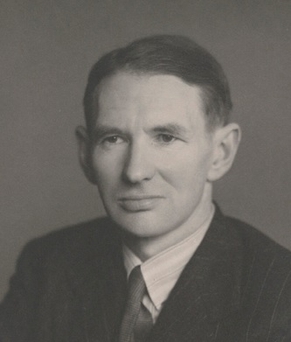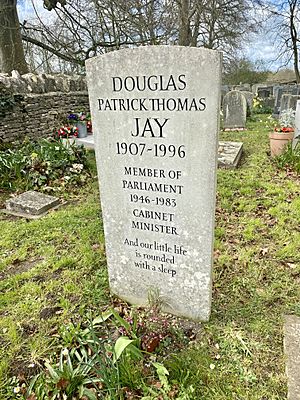Douglas Jay facts for kids
Quick facts for kids
The Lord Jay
|
|
|---|---|

Jay, pictured in 1949
|
|
| President of the Board of Trade | |
| In office 18 October 1964 – 29 August 1967 |
|
| Prime Minister | Harold Wilson |
| Preceded by | Edward Heath |
| Succeeded by | Anthony Crosland |
| Financial Secretary to the Treasury | |
| In office 23 February 1950 – 30 October 1951 |
|
| Prime Minister | Clement Attlee |
| Preceded by | Glenvil Hall |
| Succeeded by | John Boyd-Carpenter |
| Economic Secretary to the Treasury | |
| In office 13 November 1947 – 23 February 1950 |
|
| Prime Minister | Clement Attlee |
| Preceded by | Office created |
| Succeeded by | John Edwards |
| Member of Parliament for Battersea North |
|
| In office 26 July 1946 – 13 May 1983 |
|
| Preceded by | Francis Douglas |
| Succeeded by | Constituency abolished |
| Personal details | |
| Born |
Douglas Patrick Thomas Jay
23 March 1907 |
| Died | 6 March 1996 (aged 88) |
| Nationality | British |
| Political party | Labour |
| Spouses | Peggy Jay Mary Thomas |
| Children | 4, including Peter Jay (born 1937), Helen and Catherine Jay (born 1945) |
| Alma mater | Winchester College New College, Oxford |
Douglas Patrick Thomas Jay, Baron Jay (born March 23, 1907 – died March 6, 1996) was an important British politician. He was a member of the Labour Party. He held several key roles in the government during his long career.
Early Life and Education
Douglas Jay went to school at Winchester College. He then studied at New College, Oxford, which is part of Oxford University. He was a very bright student. He won an essay competition in 1927 and earned top grades in his studies.
After university, he became a special researcher at All Souls College for several years. He started his career as a journalist. He wrote about economics for well-known newspapers like The Times and The Economist. Later, he worked for the government. He helped with important tasks in departments like the Ministry of Supply.
In 1937, Douglas Jay wrote a book called The Socialist Case. In this book, he shared his ideas about how society should work. He once wrote that government experts sometimes know what is best for people. This was especially true, he thought, for things like health and education. This idea became quite famous and was often talked about by other politicians.
Becoming a Member of Parliament
Douglas Jay became a Member of Parliament (MP) in July 1946. He represented the area of Battersea North in London. He was an MP for a very long time, until 1983. At that time, his local area changed its boundaries.
He helped bring new economic ideas to the Labour Party. These ideas were from a famous economist named John Maynard Keynes. Douglas Jay served in important government jobs. He was the Economic Secretary to the Treasury from 1947 to 1950. Then he became the Financial Secretary to the Treasury from 1950 to 1951. These roles involved managing the country's money.
Later, from 1964 to 1967, he was the President of the Board of Trade. This job involved looking after Britain's trade with other countries. In 1951, he became a member of the Privy Council. This is a group of senior advisors to the King or Queen.
Douglas Jay did not support the UK joining the European Communities. This group later became the European Union. He campaigned for Britain to stay out in a big vote in 1975.
Later Life and Family
In 1987, Douglas Jay was given a special honour. He became a life peer, which meant he could sit in the House of Lords. He was known as Baron Jay.
Douglas Jay was married twice. His first wife was Peggy Jay, who was also involved in politics. They had four children together. Their eldest son, Peter Jay, became a diplomat and economist. Douglas Jay's twin daughters, Helen and Catherine, were well-known in the 1960s. His second wife was Mary Thomas.


